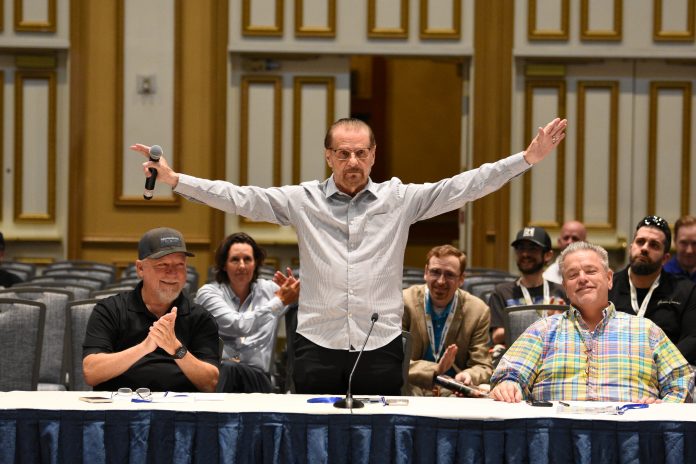(NOTE: This story appears in the May 2024 issue of ED Magazine.)
A note from ED Publisher, Dave Manack:
When Don Waitt transitioned into the role of “Founder” after promoting me, Dave Manack, to Publisher, he found himself looking for a new challenge in his semi-retirement phase. That’s when the idea hit him: He, the Founder of ED Publications and the EXPO, would interview the industry’s “founders,” those individuals who played an instrumental role in the establishment and growth of the “gentlemen’s club industry” from the 1970s through to today. In most cases, Don hopped on a plane to meet with the interviewee in person, in their own surroundings. That was important to him — not just that he would conduct these interviews in person, but that he’d be able to soak up a bit of the world occupied by the founder he was interviewing.
Don wasn’t just looking for a challenge, however. He wanted to document the history of this industry by getting the “real,” in-depth backstory of every person he deemed a “founder” for one reason or another. He wasn’t going to pull any punches, either. His approach to these stories reflected the very first job he ever had as a journalist — that of an investigative reporter for the Shreveport Times in Louisiana.
The series began with his interview with Deja Vu Founder Harry Mohney in the January 2023 issue of ED Magazine, and from that point forward he wrote the stories that, he felt, would establish not only the legacy of the adult nightclub industry, but his own as well, as the man who began writing about adult clubs over 30 years ago. His following Founders Interviews included conversations with Michael J. Peter, David “Slim” Baucom, John Gray, Luke Lirot, Frank Bane, Dick Snow, Duncan & Scott Burch, and now, his final Founders Interview with Jim St. John. If you haven’t read these stories, I strongly suggest that you do; you can find all of the stories on our website, ExoticDancer.com.
I did my best to bring Don’s interview with Jim St. John to you, our readers. He wasn’t finished with the story at the time of his passing, and I’ve done my best to maintain the integrity of Don’s vision for these articles.
For those who don’t know Jim St. John … where have you been all these years?! Go ahead and look back at the photos from EXPOs in 1994, 1995, 1996 … or 2006 … or 2012 … or 2024. Or any year in between. His face and his persona — and the annual photo of him standing at the EXPO with arms outstretched proclaiming, “I AM Jim St. John” — have become synonymous with the convention and with the industry at large. He’s not just a founder, he’s a father figure for our industry. He’s also an ED Hall of Famer, following his induction in 2008 for his decades with Deja Vu, while also working with the Christie’s Cabaret chain. He is currently the Vice President of Acquisitions with Spearmint Rhino, and has also served as the President of ACE National.
There isn’t anything I can tell you about Jim St. John that Don Waitt doesn’t in this, his final Founders Interview. I sincerely hope you enjoy it, and the rest of the Founders Interviews, as much as he enjoyed writing them.
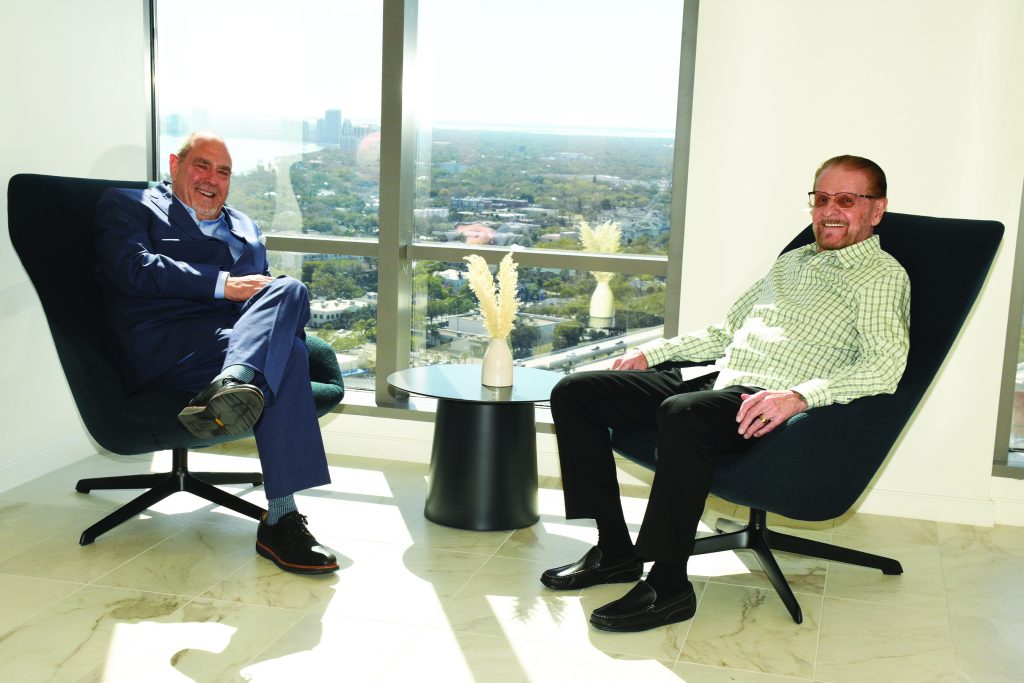
WAITT: First off, I feel like I’m interviewing my dad. You aren’t that much older than me, but over the past 30 years, I’ve always considered you a father figure because of all the advice you’ve given to me and to ED Publications over the years.
People say that you are in the strip club business, but I would argue that you are in the advice business. You’ve been the front man, shot caller and advice dispenser for some of the biggest adult nightclub chains in the industry, including Deja Vu, the Hustler Clubs, Christie’s Cabaret and Spearmint Rhino. Why do you think your advice has proven to be so valuable to these people?
ST. JOHN: I think it’s because of the people that I surrounded myself with. When I came into this business, I was a novice. I didn’t know anything. So the first thing I did was meet up with people that knew what they were doing, and one of the first people I spent some time with was Steve Cooper (of Tiffany’s Cabaret and Christie’s Cabaret fame). When I met with him, I thought, “Wow, this guy is an outright genius.” I went to spend a day with him and I ended up spending a week with him, and I walked away with a degree. He was that good. I’ve done that all my life: learn from other people, which is why I’ve always surrounded myself with the best people.
WAITT: What percentage of the time is your advice taken? And when it isn’t taken, does that aggravate you?
ST. JOHN: You know, it doesn’t. It doesn’t bother me if somebody doesn’t take my advice. I put it across in a way that they can understand it. I give them the negative and the positive to everything. So, in other words, you can think I’m wrong, but here’s why it’s this way and here’s why it’s that way. And it seems that, you know, people sort of grasp at that. The other thing is that I can say this with all honesty — I don’t want to ever give anybody any BS. If it’s coming from me, you can take it to the bank. It might be right. It might be wrong, but it’s no BS.
“My theory has always been that whether someone comes in with $20 in their pocket or $5,000 in their pocket, I’m going to treat them the same way.”– Jim St. John
WAITT: When and where were you born?
ST. JOHN: Detroit, Michigan in 1940. I’m 83 years old.
WAITT: Did you have siblings?
ST. JOHN: One brother and four sisters.
WAITT: What did your father do for a living?
ST. JOHN: He worked in the Kelsey-Hayes (wheel manufacturing) factory. Never made more than $75 a week.
WAITT: So there was no interest on your part in following in those footsteps?
ST. JOHN: No.
WAITT: Did you play sports in high school?
ST. JOHN: I played basketball. I played baseball. I was an inner city guy. When I went out for the basketball team, the best player on the team came up to me and said, “There’s no room for you here.” I ended up being the captain of the team. I can say I was a pretty good baseball player and a good basketball player.
WAITT: And did you go to college?
ST. JOHN: No.
WAITT: What early jobs did you have?
 ST. JOHN: I worked for the Sherwin-Williams paint company as a stock boy and then I went to work for them selling paint for a while. A friend of mine was a disc jockey, and I wanted to be an engineer for a radio station. So I went to a school in Los Angeles to get a first-class engineer’s license.
ST. JOHN: I worked for the Sherwin-Williams paint company as a stock boy and then I went to work for them selling paint for a while. A friend of mine was a disc jockey, and I wanted to be an engineer for a radio station. So I went to a school in Los Angeles to get a first-class engineer’s license.
The first radio station I worked for was in Hammond, California. I went in there as an engineer. One Sunday, the DJ didn’t show up so I called the owner and said, “What are we going to do?” and he said, “You’re gonna have to go on the air.” I said, “I’ve never been on the air before,” and he said, “Well, tonight you will be.” So I went on the air and did three hours, and the next day the owner called me and said, “You’re no longer an engineer. Now you’re a DJ.” I’ll be darned. So now, that’s in Hemet, California. I’m living in Alhambra, California. And between there was Ontario, California.
There’s a station called KASK, the 1510 Music Mint. I wanted to work there. So anyway, I called the station on a Saturday and I said, “Can I talk to the program director?” and he says, “Well, he’s not here. I’m Rick Armstrong, I’m the general manager. What can I do for you?” I say, “I’m Jim St. John and I’d like to work for you. I’m better than anybody you have.” He laughs and says, “Well, come in and see us on Saturday.”
So I drive down there on Saturday, walk in, and I think we’re going to sit down like this and talk. He says, “Go on the air.” Now, all radio stations are different. Formats are different. I’m thinking, he called my bluff here, so I go on the air. I do an hour. He takes me in and says, “You’re hired. You’ll do the 10 to 2 shift at KESK Musicman.”
I was very excited to have that job. But I’m not there long before I get a call from a guy named Brian Halter. He calls me and says, “I’m from WJIM in Lansing, Michigan and I’d like to hire you. I like your program.” I said, “I’m not going to go to Lansing, Michigan.” He said, “Well, here’s my number,” and so forth, and then I got off the phone, and about a week later, I thought, “You know, why don’t I go back to Michigan? My folks are still there, 70 miles away.” So I called Brian and told him I’d changed my mind, that I’d go work for him.
WAITT: You’ve told me this story previously. Somehow, the DJ gigs lead you eventually to Harry Mohney, is that correct?
ST. JOHN: Yes, that’s true. I went to work for WJIM in Lansing, Michigan in March of 1967. I ended up working for WBIC in Lansing, and one day, I was playing golf and met Harry Mohney on a golf course, and the rest is history.

WAITT: So you’re working at the station and you meet Harry Mohney on the golf course at a golf tournament he was sponsoring. And he takes a shine to you.
ST. JOHN: I thanked him for the tournament, and when I went back to the radio station, I got about 25 albums and sent them to him. He liked that. I didn’t do it for any other purpose but to thank him. He said, “Let’s play golf sometime,” and we just hit it off.
We play golf a few times. My radio station was going to be sold for the third time that I was there. If you’ve ever been in the radio business, a sale is the worst thing that can happen, because a new management team comes in and they want to change everything. So I told Harry I was thinking about leaving, and he said, “Why don’t you come on board and help me out?” And that was how it started.
WAITT: What was your first impression of Harry when you met him?
ST. JOHN: How can I describe it? He was an interesting individual in that you could tell he was very smart. No question about that. He had his pulse on a lot of things. He was very energetic and was not afraid to take chances. He made some moves when I was there that I thought were not smart. I thought, “Oh no, I don’t know if I’d ever do that,” and they all worked out!
WAITT: What’s interesting is you say Harry is very energetic and moves fast. But in person, he’s the most low-key guy.
ST. JOHN: It’s the way that he handles things. But if you’re around him in the inner office, it’s different. It goes a lot faster than you think. And the one thing you learn is you better go in there and know what the hell you’re talking about. He has always said to me, “I like when you come in because I know your gun’s loaded.” Don’t go in there and try to figure it out on the fly, and don’t try to bullshit him either.
“I’ve learned more from the EXPOs than anybody could ever take away. When I go there, I observe everybody. I meet up with everybody … the convention, as I’ve said all these years, is a wonderful way to get together and learn.”– Jim St. John
WAITT: Harry has several peep arcades at the time, which you helped him manage. But then VHS comes out and people aren’t going to the arcades anymore. So what was the idea for those arcades?
ST. JOHN: I remember going into Harry’s office and saying I want to convert the peep arcades and theaters into juice bars and he says, “No, no, no, we’re not going to do that.” I said, “Harry, it’s the wave of the future.” I can remember saying it like that. So that’s what I started to do. Harry had one great suggestion that helped me out through this process because we didn’t know anything about adult nightclubs. He said, “Why don’t we get Noel Edwards, the guy that we bought the first club from, to come and help build out these new juice bars?”
So we hired him to come in. We built the first juice bar in Kalamazoo, then Lansing, then Flint, Michigan, then the one in Springfield. And it was amazing. The theaters were probably doing five to six hundred dollars a week. And within five weeks with the juice bars, we were doing four or five thousand dollars a week.
WAITT: Today there is a blueprint for opening one club and expanding into a national chain. But back then, no one had done it. You couldn’t say, hey, let’s be like Ricks or Spearmint Rhino because they didn’t exist then. So what roadmap did you follow?
ST. JOHN: We didn’t follow, it just fell into our lap. We had bookstores that had theaters that we turned into clubs. We were just following that path. Did we ever think we’d get to where we were at? No way, shape or form.
WAITT: How did you learn the nuts and bolts of nightclubs? Because there’s a world of difference between a peepshow arcade and an adult nightclub.
ST. JOHN: From Noel Edwards, who we bought the first club from. I brought him aboard to build the first three or four clubs and that was our blueprint. I had somebody there who could teach me what to do. So Noel was really my salvation there. After that, Harry and I went around the country and visited some juice bars. I just went in to see how they did it. We were probably more aggressive about making it better than it was.
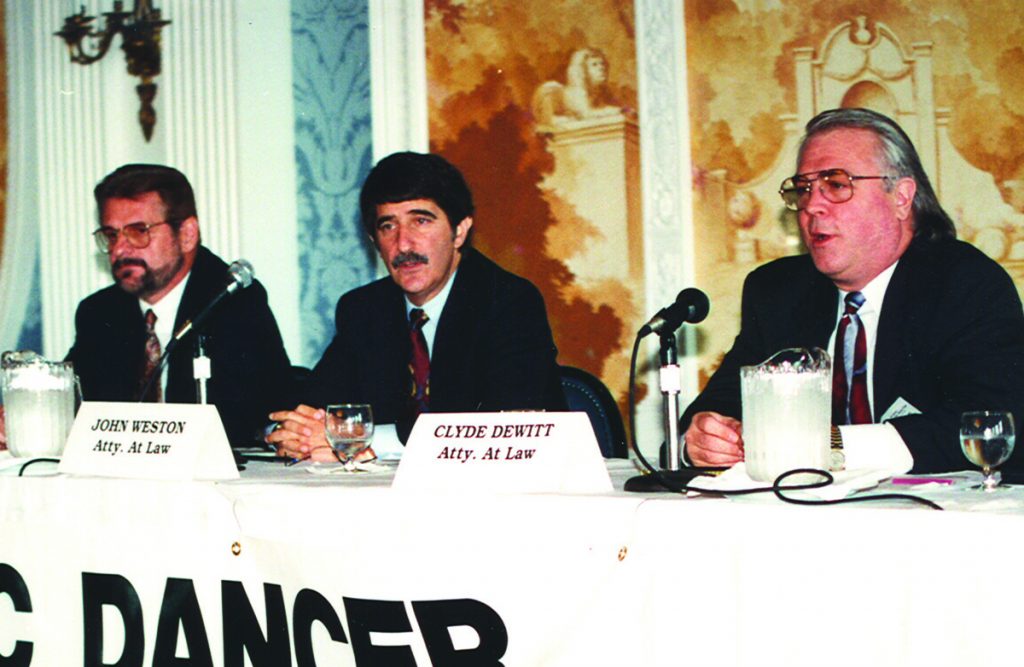
WAITT: So after you’ve been going on for a while, then Michael Peter starts, and you start to see some movement toward club “chains.” Were you keeping your eye on those new developments, or were you too busy building your own chain to pay attention?
ST. JOHN: No, we paid attention. Because now I realize I’ll have to learn how to run alcohol clubs as well. I want to give Steve Cooper (owner of the Christie’s Cabaret club chain—Ed.) a lot of credit for that. So I went out to Memphis where he had Tiffany’s Cabaret. He didn’t know me from Adam but we hooked up and he sort of liked me. He didn’t just tell me how to do things, he also told me why you do it. He would explain it in detail. Here’s what you do. Here’s why you do it. When I walked away from that, I thought, “You put me on another level, man,” because Steve Cooper is so good at what he does. I mean, that’s it. So he sort of got us started, and we started expanding into alcohol clubs.
WAITT: Why do you think Cooper was so generous in sharing that information?
ST. JOHN: You know, just two guys hitting it off.
WAITT: During your time at Deja Vu, you were the “face” of that chain. People in the know knew that the chain was owned by Harry Mohney, but the rank and file people who read ED Magazine and attended the EXPO associated you with Deja Vu. Was that a blessing or a curse?
ST. JOHN: It was definitely a blessing. It allowed me to meet everyone. For example, I learned more from the EXPO than anybody could ever take away. When I go there, I observe everybody. I meet up with everybody. All I’m there for is to pick their brains and they want to pick my brain, which was what I wanted to do anyway. The convention, as I’ve said all these years, is a wonderful way to get together and learn. I’d be a dummy if it wasn’t for that.
WAITT: The Deja Vu chain included other brands like Little Darlings and Dream Girls, but Deja Vu then took over management of the Larry Flynt Hustler Clubs.
ST. JOHN: We didn’t take over. We built those clubs. The first one was done in 2002 in New York.
WAITT: Did Harry and Larry Flynt co-own them?
ST. JOHN: Larry had an option to buy into any of them. If he didn’t buy into them, then he got a fee for using the name. He screwed up and didn’t buy into New York, which was our number one. He was a partner in Las Vegas and New Orleans. All the rest of the Hustler Clubs he just got a fee from.
WAITT: Weren’t you initially opposed to doing the Hustler Clubs?
ST. JOHN: Well, I didn’t think the name was anything that would help us. Back in those days, if you picked up a Hustler magazine, they had people peeing on each other and doing all kinds of stuff, and I didn’t think that was the image that we should carry across. But Harry was right in the respect that we got instant notoriety. I got along extremely well with Larry. I had a hard time understanding him because he had gotten shot, but I’d always take Jimmy (Larry Flynt’s brother) with me to translate.

WAITT: I remember when you got Larry for us to do the Keynote Address at the EXPO in 2004. That was the most well-attended keynote that we ever had.
ST. JOHN: Do you remember how I introduced him? It’s a great line. I said, “ED Publications has asked me to introduce Larry Flynt when he needs no introduction. But I want to thank you, Larry, because you taught me how to read a magazine with one hand.” He loved that.
WAITT: Deja Vu has had as many non-alcohol clubs as it has had alcohol clubs. Which clubs are easier to run and which ones turn the biggest profits?
ST. JOHN: The juice bars, if run correctly, are easier to run and they make a lot of money. Of the five best clubs that Deja Vu has, one is Little Darlings in Las Vegas, a juice bar, right? That club has made so much money over the years. So the juice bars make you money. The alcohol bars are more difficult to operate, especially in this day and age.
WAITT: Every type of adult nightclub, from alcohol to non-alcohol, topless to nude, blue-collar to white-collar, single-story to three-story, was under the Deja Vu umbrella. How challenging was that to have such a variety of venues? Did you have to put on a different hat every time you walked into a different venue?
ST. JOHN: The answer goes back to the help I got and what I learned from other people with the experience and expertise. I had people like Joe Carouba (of BSC Management) in San Francisco who came up with a lot of ideas and told me how to do certain things.
WAITT: How often were you traveling?
ST. JOHN: I was traveling at least once a month. Some clubs like New York, I probably went there a little more often. I would go down to Florida or wherever we might have clubs.

WAITT: What would you say were your three biggest accomplishments during your time at Deja Vu?
ST. JOHN: The first one we already talked about, which was the innovation of taking bookstores and turning them into nightclubs. Number two was when we expanded the clubs into the alcohol business, which I was sort of against in the beginning because they had all the dram shop laws. I think the third accomplishment was being accepted in the industry and being part of it. To me, that’s one of the greatest accomplishments that I’ve ever had.
WAITT: Harry Mohney is an unstoppable machine. He recently turned 80, and just last month, he bought the Margaritaville Casino in Biloxi. Mohney’s modus operandi has always been to find a location, make a great deal, put in good management and then quickly move on to the next deal, whether it is an adult club, a regular nightclub, a karaoke bar, a restaurant or a gaming venue. Harry quickly grew the largest adult nightclub chain in the country, a record that still stands today. What was that roller coaster like all those years working with Harry?
ST. JOHN: We had good times together. We were in the office one day and he says, “You know what’s so good about the two of us is that you see things one way and I see it another way.” And he says that’s good. But we were hardly ever on the same page. When he would come up with an idea, I wasn’t one of those people to say, “Yep, yep, yep.” So everything that he did, he knew he was going to get the truth from me.
WAITT: Eventually you and Harry parted ways. I remember being at an ACE National Board meeting, and you told the board that you had left Deja Vu. And to me, it felt like my parents were getting divorced. Everybody was shocked. What year was that split, and why do you think it happened?
ST. JOHN: It was 2010. Harry had said all along that when we turned 70, we were going to retire. I said fine, but I also knew that he was never going to retire.
WAITT: But you two are still sociable and friendly?
ST. JOHN: Oh yeah. There’s no animosity or anything like that.
WAITT: After Deja Vu, you went to work for Steve Cooper. How did that come about?
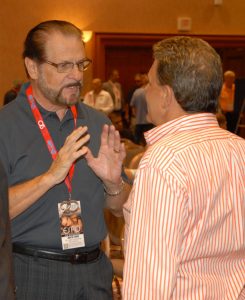
ST. JOHN: I had dinner with him and Dean Reardon (now with Rick’s Cabaret), who was his head man there. We talked about me coming to work for him. I said, “Well, I don’t know if I want to do that.” And he says, “Well, remember when I helped you out.” So I went to work for him for about a year in 2011. I don’t even know if they ever gave me a title. I just went in and helped Dean fix the clubs. Dean and I turned them all around.
WAITT: We inducted Steve Cooper into the ED Hall of Fame back in 2006. He’s an elusive character; very successful, yet rarely seen at EXPO. What can you tell us about working with Steve and your time spent with him?
ST. JOHN: He is such a dynamic individual as far as business is concerned. His mind is going a mile a minute. When I first met him way back then, he took me into his office and had drawings on that table of the clubs and the future of this industry that were even ahead of what Michael Peters did. I mean his clubs were phenomenal. He blew my mind. I said to myself, “This guy really knows what he’s doing.”
WAITT: From Christie’s, you moved on to another successful club chain, Spearmint Rhino. How did that happen?
ST. JOHN: (Former California Girls club owner) Glenn Smith had a lot to do with that. Glenn Smith and I were talking and he said Kathy (Vercher) is looking for somebody and would I be interested. He put me in touch with Kathy and we met in Norco, California (at Spearmint Rhino’s corporate office). She said, “I need you, what you bring to the table,” and so forth. And I said okay. This was around 2013.
WAITT: Speaking of ED Hall of Famers, Kathy Vercher isn’t just one of the industry’s most powerful women, she’s one of the most accomplished professionals this industry has ever seen. What has it been like to work with her on a one-on-one basis?
ST. JOHN: She astounds me. She is one of the smartest women I’ve ever met in my life. This industry, she takes it to a different level. She runs everything in that whole corporation. She and I get along great. I said, “Here’s where you’re wrong. You answer everybody’s phone call.” I had a meeting with all my people many years ago. I said, “Don’t ever call me with a problem again unless it’s legal. Other than that, what did I hire you for? I want you to fix the problem.” And it changed my world and changed their world, too. So I said to Kathy, “That’s what you have to do.” Because she does everything. And she still does it.
WAITT: And so what is your role at Spearmint right now?
ST. JOHN: Vice President of Acquisitions.
WAITT: Did you talk to John Gray also?
ST. JOHN: That’s an interesting thing. John and I used to talk twice a year, every year that I was in the industry. I liked talking to John because he would ask really good questions. He always wanted to know, so why are you doing this or that? It was always a good conversation. Twice a year I could count on it. But since I’ve been at Spearmint Rhino, 10 or so years, I’ve only talked to him three times.
“The juice bars, if run correctly, are easier to run and they make a lot of money. Of the five best clubs that Deja Vu has, one is Little Darlings in Las Vegas, a juice bar. That club has made so much money over the years. So the juice bars make you money. The alcohol bars are more difficult to operate, especially in this day and age.” – Jim St. John
WAITT: Why do you think Kathy brought you on board?
ST. JOHN: She had a guy that was the second in command. She needed to expand, so he had been hired. When she brought me on and took me into the office, he said, “Why do we need Jim St. John? I can do that,” and she said to him, “Jim St. John can stick his foot in any door and people are going to talk to him. Nobody knows who you are.” So, my reputation preceded me and that was her reason for bringing me aboard.
WAITT: Kathy does not like the spotlight. It was like pulling teeth to get her to accept being inducted into ED’s Hall of Fame in 2018. When I point out to her that she is the highest ranking female executive in the history of the strip club industry, she just shrugs it off. Do you think she realizes the magnitude of her accomplishments?
ST. JOHN: Well, the answer is she should. Because they’re magnificent. The decisions she makes and so forth. She’s unbelievable. She does legal. She does the contracts for everything. She’s on top. I don’t know half that stuff. I had (attorney) Brad Shafer (while at Deja Vu). I had a transactional attorney that did all that other crap. She does all that stuff. I could never do what she does.
WAITT: I get the impression she can be very tough if needed.
ST. JOHN: She can be a bear. There’s no bullshit. She’s about come in and let’s get it done and let’s get on your way. Because she has such a busy schedule anyway. She’s diplomatic and she just follows it right down the line, to a T.
WAITT: What is your typical work week?
ST. JOHN: I stay in touch with all the people who have called me over the years. I also have a list of clubs out there right now that, one of these days, hopefully, we’ll come together on. I never stop working on them. The problem always is the owner says their club is now worth more because we’re going to take it over. They just can’t get over that. And I tell them, “Well, when you come back to reality, we’ll make a deal.” So there are at least seven locations that I’ve been working on for three or four years.
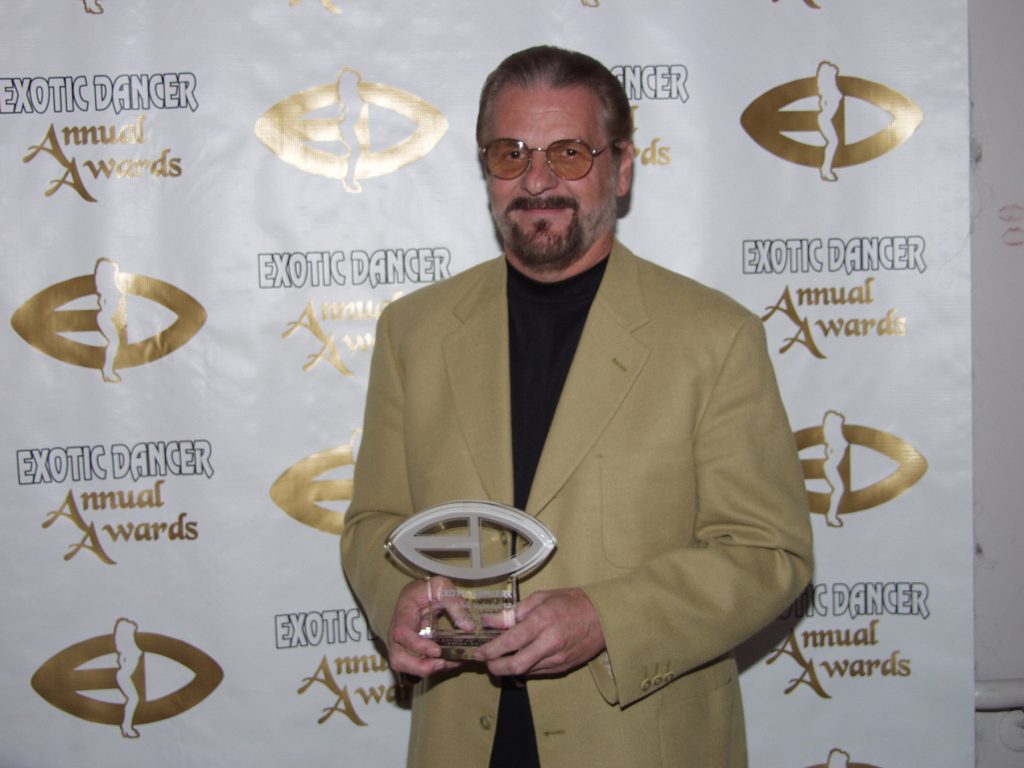
WAITT: Who were your mentors when you started, or who did you turn to for inspiration and guidance over the years?
ST. JOHN: Steve Cooper was really the key to me. Then Duncan and Scott Burch. Glenn Smith was another one, as was Slim Baucom. And one of the best operators in the world, and the guy that impressed me the most, is Joe Redner (of Mons Venus in Tampa).
WAITT: Why do you think no one is building any more dynasties of club chains, like Deja Vu, Ricks and Spearmint Rhino? The Pony Clubs and Bucks Cabaret are the only recent dynasty builders, and there don’t seem to be any others waiting in the wings.
ST. JOHN: One phenomenon that I’ve noticed is that not many sons or daughters are following in their father’s footsteps and preparing to take over their father’s clubs. Jason Mohney is one high-profile exception, but in most other businesses, if you’re in the lumber business or you’re in the car dealer business, your son comes over and takes it over. And we would know about the sons because they’d be at the EXPO. The owner would be introducing them. I don’t see that. I don’t see this next generation taking over those clubs.
WAITT: Assuming that’s true, that the older owners don’t have children they’re going to pass their business along to, what do you think is going to happen to those clubs, or to the industry at large?
ST. JOHN: It’s a tough business to be in. In the last five years it’s been exceptionally bad. So, I think that (the children) are sitting by the wayside saying, when the time comes, we’ll just sell the club(s).
WAITT: My son is now 40, but from age 30 to 40, neither he nor his friends went to strip clubs. When I was growing up, we all went to strip clubs. I don’t see strip clubs being as popular with young people as they were back when I was young.
ST. JOHN: A lot of the clubs have transformed their business into something that the customer can’t afford anymore. In other words, if you come in, you better have a chunk of change in your pocket. My theory has always been that whether someone comes in with $20 in their pocket or $5,000 in their pocket, I’m going to treat them the same way. Today, if a customer comes in and the club thinks they don’t look right, or they don’t wear the right watch, or they don’t have the right clothes on, they resent it. Juice bars were great because we got those 18-year-olds. They’re coming out of high school and that’s the first place they’re going. If you treat that 18-year-old like he is in a big-time club, when you do open up another club, he’ll move to that club automatically. The first thing is to treat all your customers with all the respect.
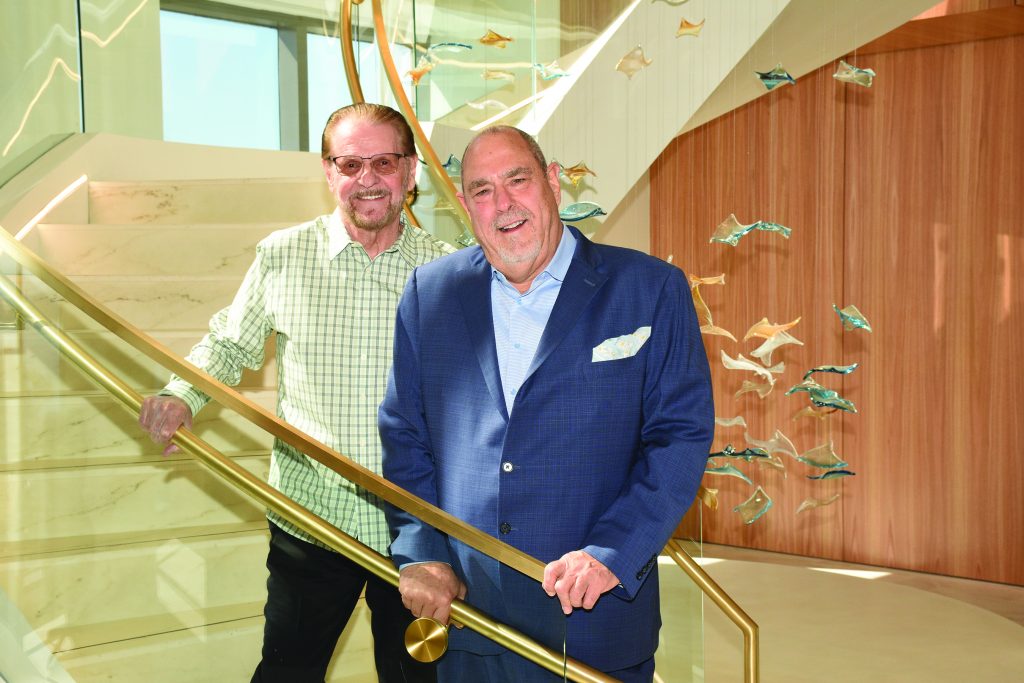
WAITT: Eventually, every club owner wants, or needs, to sell. What advice would you give them now if they’re preparing to sell in the near future?
ST. JOHN: When I go into a market to look at buying a club, I go into the competition’s clubs first. I’m going in to see what they are doing. The number-one thing they should be doing is making their business better than it currently is. Everybody I talk to wants me to buy the club at a price based on what I’m going to do with the club. I can’t do that. I can only pay for what you do. The appraisal and the P&L are everything. If you want more money, you have to do something with that P&L.
WAITT: When you walk into one of those clubs for the first time, besides the P&L, what are you looking for that will help you determine whether it’s a good buy or not?
ST. JOHN: Well, first off is the area. Secondly, is the way the club is being run, as far as hospitality is concerned. How do they manage this club? I don’t want to have to reinvent something. So, I look at the area, I look at the hospitality and I look at how they run the club and their service. And when you do that, you have a pretty good idea what it’s all about.
WAITT: What’s the one warning sign that if you see you know right away you’re not buying the club?
ST. JOHN: It’s usually the owner. You can’t get around that.
“[Female managers] are better than, I hate to say it, they’re better than men. They work harder, they understand the entertainers a lot better than the men do.” – Jim St. John
WAITT: Thirty years ago, even 20 years ago, there were very few female managers. If a woman wasn’t dancing at the club or serving drinks, she was a house mom, but they weren’t in management roles. Today the industry has numerous female managers. What do you think of female managers, and why do you think it took this long for them to be given management roles?
ST. JOHN: They’re the best at what they do. They’re better than, I hate to say it, they’re better than men. They work harder, they understand the entertainers a lot better than the men do. They’re easier to work with and they’re better at quelling problems that are in the club. You know, they just handle things a lot better. Kathy has a lot of female managers these days, and they’re all good. They’re just good employees and they’re great managers.
As far as why it’s taken so long, maybe there’s a bit of jealousy when the women turn out to do a better job (running the club) than the owner. It gets back to some of these owners. Sometimes, you can’t shake their hands because they’re too busy patting themselves on the back. It’s really the females that are making it happen.
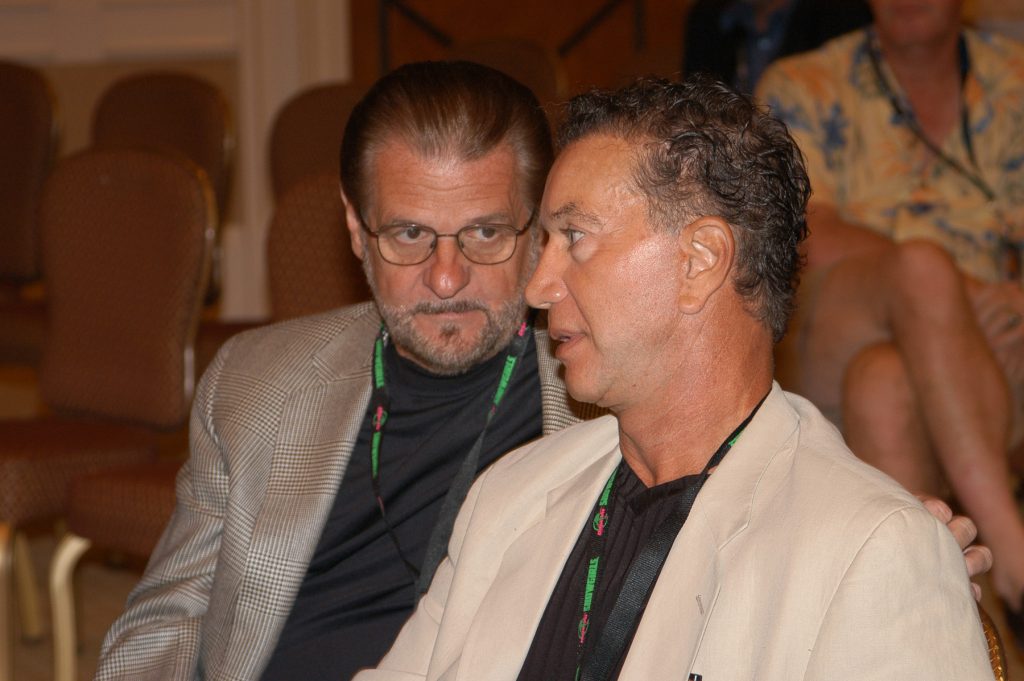
WAITT: Okay, I’m asking all the founders these four questions. First, what is the biggest mistake new first-time club owners make?
ST. JOHN: They just don’t know what they’re doing. I mean, that’s the first thing.
WAITT: What is the biggest mistake owners who’ve had their club five or more years are making?
ST. JOHN: Not adapting to the times.
WAITT: Who is the most valuable person at an adult club?
ST. JOHN: Well, it’s the general manager. The floor host is also very important, but the general manager is the most important person. If he’s good at what he does, he can put the right people in places to do the right things. But the floor host is the guy that, you know, that’s the straw that serves the drink.

WAITT: Who’s the most dispensable person in the club?
ST. JOHN: You know, Duncan Burch said “the owner” in his Founders Interview, so he beat me to it (laughs). But I have to be careful because I work for so many of these people. That’s the answer. But really, the most dispensable person is that person that you have in the club who thinks he knows more than anybody else. The one thing about this industry is, it is nothing like it used to be. It’s just a whole different industry right now and you can’t be a know-it-all and be successful.
The customers are different. The dancers are different. The management teams are different. The clubs themselves, the way they’re built are different. You know, I say this to everybody I meet: I learn something new every day, and unless you’re in that mode, you’re going to be behind that eight ball.
WAITT: You were inducted into the ED Hall of Fame in 2008. I remember a few years later you thanked me at dinner saying the speech that (ED Publisher) Dave Manack wrote had touched you and that you remembered it fondly. Why did that speech and the award mean so much to you?
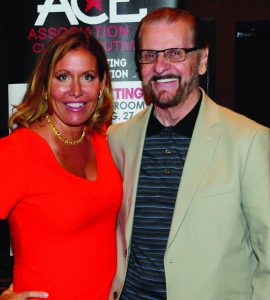
ST. JOHN: Because I felt that I’d reached a plateau. You can do what you do all your life and nobody ever acknowledges it. But when I heard that (Hall of Fame induction), it sort of took me to another level as far as my thought process is concerned.
WAITT: When I was reluctantly inducted into the ED Hall of Fame last year, I kind of hated going on stage. I gave my speech, I thanked a number of people whose advice and guidance over the last three decades has been impactful to me, and you were the first name I mentioned. Why have you been such a good friend to ED and the EXPO and myself all these years?
ST. JOHN: Well, the EXPO, as I said earlier, made me what I am. In other words, without that foundation, without that product being out there for me to gain knowledge, to meet the people in the industry, why are we doing what we’re doing? It was like a college that I’m still going to. I’m still learning, so that’s important to me.
WAITT: You were also one of the founding members of ACE and served on the board several times as president. Why is it important for you to be involved with associations and organizations that promote the industry?
ST. JOHN: Because I think I bring something to the table. I can talk on a one-to-one basis with anybody. I think that anybody could come to me with a problem. I’ve either had it or, you know, something similar to it. So it was important for me to translate what I know and what I do to help everybody else. Do you know how many phone calls I get on a monthly basis? I mean, at least half a dozen a month where people are saying, “Hey Jim, what do you think about this?” or “What do you think about that?” And I tell them. Kathy doesn’t have a problem with that.
But there are certain people that would say, “Well, what’s your motivation to help other people if you’re not working for them?” Pure and simple, I just want the industry to thrive. I want to be proud of it. And so it’s important that somebody comes in, you know? I gave another speech at one of the conventions where I said, I don’t know if you remember it, I said, “VIP rooms are the best thing that ever happened to the business and the worst thing that ever happened to the business.”
WAITT: You’ve been in this industry for more than a half century, and you don’t appear to have any vices. Did you have to fight those urges in the early days or have you always been happy following the straight and narrow?
ST. JOHN: I learned that while I was in the radio business. Back in those days of payola and cocaine and all that stuff, it was so prevalent in the radio industry. I learned to stay away from all those things then. I said, “I don’t want to have anything to do with it.”
I’ve never done drugs. I’ve never smoked. I stopped drinking 30 years ago. I’ll tell you why I stopped drinking. I’d go to a restaurant, I’d buy a meal, and the meal was $10 and the booze was $50. I’d think, “What am I doing?” I didn’t really enjoy it anyway.
“The EXPO . . . made me what I am. Without that foundation, without that product being out there for me to gain knowledge, to meet the people in the industry, why are we doing what we’re doing?”– Jim St. John
WAITT: You already mentioned that you’re 83. You don’t look your age. You have a full head of hair, very few wrinkles and you’ve always been fit and trim. How do you do it?
ST. JOHN: I’ll be 84 in three months. My wife’s in the medical profession, and she makes sure that I stay on the right types of food and so forth and so I think that has a lot to do with it. I have a wife that’s 17 years younger than me. I can’t afford to be fat and ugly and outta shape!
WAITT: Twenty years ago, the industry was on fire. Clubs were opening left and right and were packed with energy. Fast forward to today, and the industry is no longer growing. It’s even shrinking. Why do you think that trajectory stopped?
ST. JOHN: The internet. It just has everything that you want. The reason that we had girl shows in our peep booths is because you couldn’t get a girl on TV. And when we got into the strip club business, it was the same thing. You had to come in to see it. Right now, the internet has changed that. OnlyFans has changed that. You can sit home and the guy that used to come in to see Tiffany on stage, can now see Tiffany is in his bedroom (on OnlyFans). And that’s the biggest difference of all.
WAITT: Looking back, how has the industry changed? Let’s start first with the positive. What are some ways the industry is better today than it was in the past?
ST. JOHN: Well, that’s an interesting question with a convoluted answer. Smart clubs are evolving into nightclubs, and I think that’s good and I think it’s bad. Let’s use Club E11EVEN as an example of that. They’re more of an “entertainment center” right now, and now some other clubs are bringing in “DJs” as E11EVEN does, and it may help bring in a different crowd. So we’re becoming more of an entertainment center. But today, the talent isn’t what it used to be. So now you have to adapt to it and do something different. The crowds, the Gen Z’s and the millennials, they expect something different. I mean, especially the millennials, they expect something different unless you change and bring it to them.
I’ll tell you, Slim Baucom is probably one of the smartest people I met. We were talking during the time when COVID was going on. I said, “How you doing, Slim?” He said, “I’ve never made so much money. I’m thinking, “What? How did you do that?” He says, “Well, here’s what I did: I raised my prices. I had no more free drinks, free this, free that. I’ve never made so much money. When I did that, I lost all those customers that were the ones that I didn’t want anyway.” At the time I thought, “God, that was a dangerous thing to do,” but it turned out to be a brilliant thing to do. You have to think outside that box and do things like that.

WAITT: But you said that if they’re trying to switch into nightclubs, it’s a good thing and a bad thing. How’s it a bad thing?
ST. JOHN: Well, because we are what we are. And when you have to adapt to be something else to be successful, I don’t like that. The strip club industry, it’s still there. And we just have to do it better than anybody else.
WAITT: You’re the advice guy. What does the industry need to do to get back on track? You know, you and I have had conversations about this. I think once we sat down and we probably talked for a half hour.
ST. JOHN: When one of the first EXPOs was in Las Vegas, we hosted a party at our Deja Vu juice bar, and we had a lot of people show up. Maybe 1,000 people. I went there and stood at the door and greeted everybody that came in. I’m just saying, “Come on in, I hope you have a good time.” That’s what we need to do in the industry. You’ve got the guys that are watching the cash register and not watching the customer. So we have to be more friendly in the business. We have to treat the talent a lot better than we’ve been treating the talent, and so forth. What owners don’t understand, with house fees and this fee and that fee, and so forth, they’re just killing the industry.
It gets back to, I keep bringing up Joe Redner. Joe said, “Let the (entertainers) make all of their money.” If I approach it that way, I’ll get better talent, they’ll make more money. When I walk into a club, I don’t ask them how the club did last night. I ask them, “Did the entertainers make money?” That’s the first thing I want to know. If they made money, I know everything’s right.
WAITT: What’s one piece of advice from you that you hope everyone who reads this interview will take away from it? Whether they be entertainers, club owners, managers, whomever.
ST. JOHN: My advice to anybody out there is this: I see the light at the end of the tunnel. It’s there. And what it takes is the people that are getting involved in this business to be innovative, to be creative and to participate with the industry as a whole. That’s going to be the success. I didn’t get to where I am without intermingling with all these people through ED and meeting the right people at EXPO.
And that’s what we have to do. So when you come to the conventions, you’re going there to help you make money in the long run. And I still look at it that way. When I go to the convention, I’m like, “Okay, how am I going to make money?” That’s essentially the way I look at it.
WAITT: After a half century in this business, is the adult club industry still exciting to you?
ST. JOHN: Yes.
WAITT: Why is that?
ST. JOHN: I’ve had two jobs in my life that I can attest to. I was a radio disc jockey for a lot of years and I’ve been in both of these industries. I still love what I’m doing. That’s what it’s all about. When you love what you’re doing, it’s not a job, you know, and that’s how I feel. I mean, I come to every EXPO. When I’m at EXPO I’ve got a smile on my face and I’m a happy soul.
















